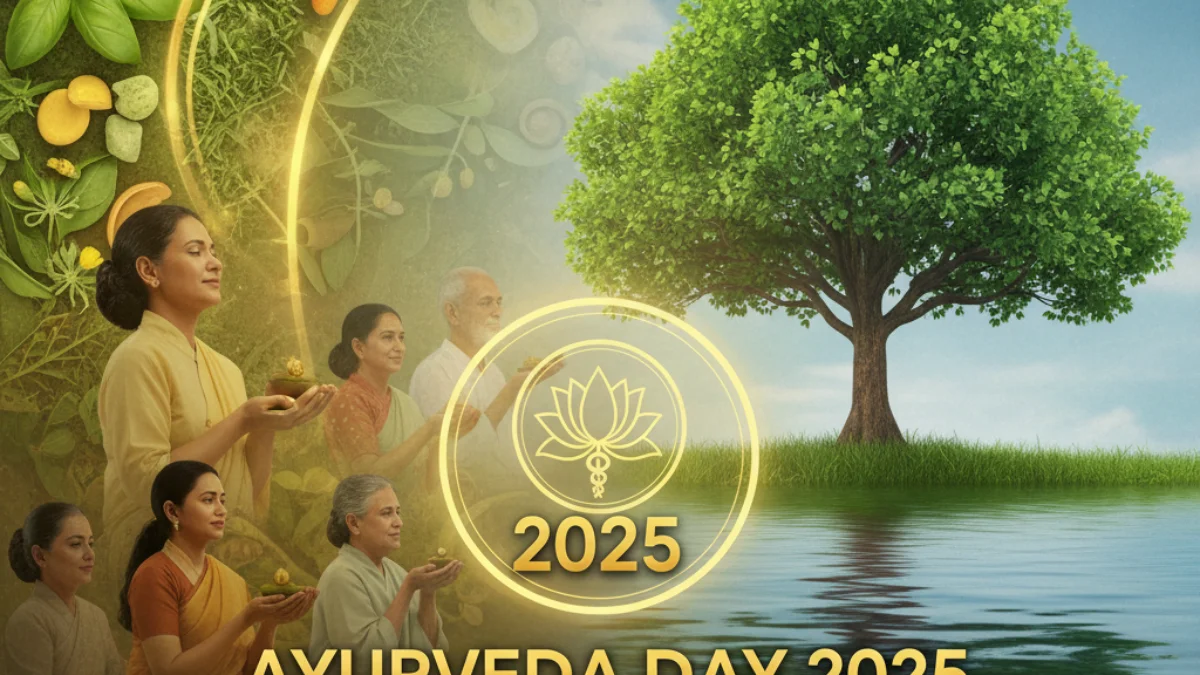Introduction:
Ayurveda Day, a national observance dedicated to promoting India's ancient system of holistic medicine, will be celebrated on September 23, 2025, for the first time on a fixed annual date, as notified by the Ministry of Ayush on March 23, 2025. This change from the variable Dhanvantari Jayanti (typically in October-November) ensures consistent global recognition and aligns with the autumnal equinox, symbolizing balance in nature—a core Ayurvedic principle. The 2025 theme, 'Ayurveda for People & Planet,' highlights the system's potential in addressing contemporary issues like lifestyle disorders, climate-related health challenges, and environmental harmony, fostering preventive care and sustainable living.
Since its launch in 2016 on Dhanvantari Jayanti, Ayurveda Day has grown into an international event observed in over 150 countries, featuring health camps, seminars, and cultural programs. In India, the Ministry of Ayush coordinates nationwide initiatives through institutions like the All India Institute of Ayurveda (AIIA) in Goa, including awareness lectures, street plays, medical camps, and 'Run for Ayurveda' events. This year's celebrations aim to engage communities, students, and farmers, debunking myths and showcasing Ayurveda's evidence-based approaches. Why does this matter? As global health systems shift toward integrative medicine, Ayurveda Day 2025 reinforces India's leadership in traditional wellness, contributing to Viksit Bharat's vision of holistic development. This article explores the day's history, significance, 2025 theme and events, cultural impact, expert insights, and ways to participate, providing a comprehensive guide to embracing Ayurveda's timeless wisdom.
History of Ayurveda Day: From Inception to Global Observance
Ayurveda Day was first celebrated on October 28, 2016, coinciding with Dhanvantari Jayanti, the birthday of the Hindu god of medicine, as declared by the Ministry of Ayush to raise awareness about Ayurveda's relevance in modern healthcare. Initiated under Prime Minister Narendra Modi's vision to integrate traditional systems into national health policy, the day has evolved from a domestic event to an international observance, marked in 150+ countries by 2025. Each year focused on themes like 'Ayurveda for Healthy Immunity' (2021) and 'Ayurveda for One Health' (2023), promoting its holistic approach encompassing diet, yoga, and herbal remedies.
The shift to September 23 in 2025, notified via Gazette on March 23, addresses scheduling inconsistencies from the lunar calendar, enabling better planning for global events. This date, the autumnal equinox, embodies Ayurveda's philosophy of equilibrium between day and night, human and environment. Over nine editions, it has spurred initiatives like the National Dhanvantari Ayurveda Award and free health camps, reaching millions and integrating Ayurveda into programs like Ayushman Bharat.
Significance of Ayurveda Day: Promoting Holistic Wellness
Ayurveda Day underscores the ancient science of life—'Ayur' (life) and 'Veda' (knowledge)—rooted in the Vedas and Charaka Samhita, emphasizing balance among doshas (Vata, Pitta, Kapha) for health. It highlights Ayurveda's preventive, personalized approach, using herbs, diet, and lifestyle to combat modern ailments like diabetes and stress, with global interest surging post-COVID (WHO recognizes 400+ herbs).
In 2025, the day addresses 'One Health'—linking human, animal, and planetary well-being—aligning with UN Sustainable Development Goals. Celebrations include yoga sessions, herbal workshops, and policy dialogues, fostering Ayurveda tourism and research collaborations.

Ayurveda Day 2025 Theme and Nationwide Events
The 2025 theme, 'Ayurveda for People & Planet,' spotlights Ayurveda's role in sustainable health, tackling lifestyle diseases, climate impacts, and biodiversity. Key events:
- AIIA Goa Coordination: Awareness lectures, street plays, medical camps, 'Run for Ayurveda,' quizzes, posters, essays, short films.
- Grand Celebration: September 23 at Goa campus, uniting policymakers, researchers, practitioners, citizens.
- Global Reach: 150+ countries; virtual webinars, yoga marathons.
- Awards: National Dhanvantari Ayurveda Award for contributors.
Union Minister Prataprao Jadhav emphasized: "Ayurveda is a life science rooted in harmony." Activities target youth, farmers, promoting preventive care.
Cultural and Global Impact: Ayurveda Beyond Borders
Ayurveda Day boosts cultural pride, with events like free consultations reaching 1 million+ annually. Globally, it promotes Ayurveda tourism (₹20,000 Cr industry) and integrations like WHO's Traditional Medicine Strategy. In India, it supports Ayushman Bharat, with 80% rural adoption.
Challenges: Scientific validation, commercialization. Future: AI-Ayurveda fusions by 2030.
Expert Opinions: Insights on 2025 Observance
Prataprao Jadhav (MoS Ayush): "Fixed date gives Ayurveda global identity; theme reflects resolve for wellbeing." Vaidya Rajesh Kotecha (DG Ayush): "Promotes harmony; addresses climate diseases." WHO's Dr. Tedros Adhanom: "Ayurveda's preventive wisdom vital for SDGs."
Consensus: Milestone for integration.
Potential Impacts: Health and Sustainability
- Health: Reduces disease burden via lifestyle management.
- Sustainability: Promotes herbal conservation, eco-tourism.
- Global: Enhances India's soft power, export potential ₹50,000 Cr by 2030.
Risks: Misuse of herbs; opportunities: Youth engagement.
Conclusion: Embrace Ayurveda's Harmony
Ayurveda Day 2025 on September 23 celebrates balance for people and planet, with events fostering wellness. Join lectures, camps, or yoga—honor Dhanvantari's legacy. For more, visit ayush.gov.in or nuvexic.com.
FAQ
When is Ayurveda Day 2025?
September 23.
What is the theme?
'Ayurveda for People & Planet'.
Why fixed date?
For global consistency, autumnal equinox symbolism.
Key events?
Camps, quizzes, 'Run for Ayurveda' at AIIA Goa.
Who observes it?
India and 150+ countries.



